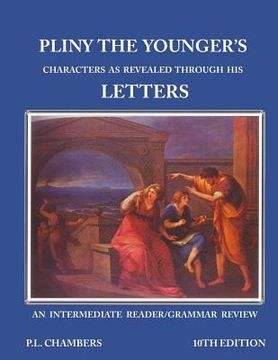Pliny the Younger's Character as Revealed through his Letters: An Intermediate Reader/Grammar Review (en Latin)
Reseña del libro "Pliny the Younger's Character as Revealed through his Letters: An Intermediate Reader/Grammar Review (en Latin)"
Pliny the Younger's Character as Revealed through his Letters is a Latin reader and grammar review designed for a one-semester course at the intermediate to advanced level. It is the fourth in the Latin Alive and Well Series. Lucius Caecilius Plinius Secundus, best known today as Pliny the Younger, was a Roman author and an accomplished attorney and administrator who left a collection of hundreds of private letters illustrating public and private life of the Roman Empire during the reign of the Emperor Trajan. I have chosen letters that see Pliny happy in study, distraught at the bedside of a sick friend, engaged in managing his estates, endowing a school, describing the events of the eruption of Vesuvius, enjoying and confiding in friends, and addressing administrative issues. Pliny viewed public service as a duty, an honor and a sacred trust. He prided himself on being trusted and compassionate and he strove to set an example for others. On assignment in Asia Minor Pliny encountered the Christians and gives the earliest account of their teaching, behavior and official repression. Translating Latin texts requires the student to recall an overwhelming array of grammatical points. Often the material for translation seems dull and lengthy beyond endurance and before he/she can begin translating, they must spend immense time looking up new vocabulary. I have address these problems and issues in these ways: -An engaging topic. Translating correspondence is especially personal. It provides a view of motivation for actions, of prejudices, of relationships, of familial duty to maintain and promote the honor and prestige associated with the family name. While it can be contrived for future readers, it always has an immediate purpose. It is especially revealing of personality and character. Pliny the Younger was a survivor of the eruption of Vesuvius in 79 AD; he wrote the first description of an actively erupting volcano; he was well known to the Flavian Emperors as well as the Emperor Trajan; he was a personal friend of the historian Tacitus; in his capacity as governor of Bithynia, he was the first public official to identify the followers of Jesus of Nazareth as "Christians." -Referenced quick grammar review. Every chapter begins with a list of specific grammatical forms the student will encounter in the chapter. To help review these quickly, I have referenced each form to a "Compiled Grammar Charts" section at the back of the book. If there is no page number listed for a grammar review topic, it is because this is a topic that cannot be listed in a table format. A review will be attained automatically through the assignments in the chapter as the grammar review exercises and sentences are designed to make these topics familiar before encountering them in the translation at hand. Also, unreferenced topics can be found online or in any introductory text. -Pertinent explanations of new grammar. Rather than list theoretical explanations, I use examples from the chapter at hand to demonstrate specific grammatical points. -Sentences. To ease translation and reduce frustration, I have derived and devised sentences from the original text or based on the original text that give a synoptic overview of the subject of the letter. After translating these sentences, the student will know the basic outline of the story and be able to identify grammatical forms and syntax in the original text. -Vocabulary lists for the translation at hand. To enable the student to devote more time to translating and to eliminate the frustration of looking up every new word in a dictionary, I have put together a vocabulary list for each chapter that is specific to the chapter reading. Vocabulary that appears in most introductory courses is in the glossary at the back of the book.

